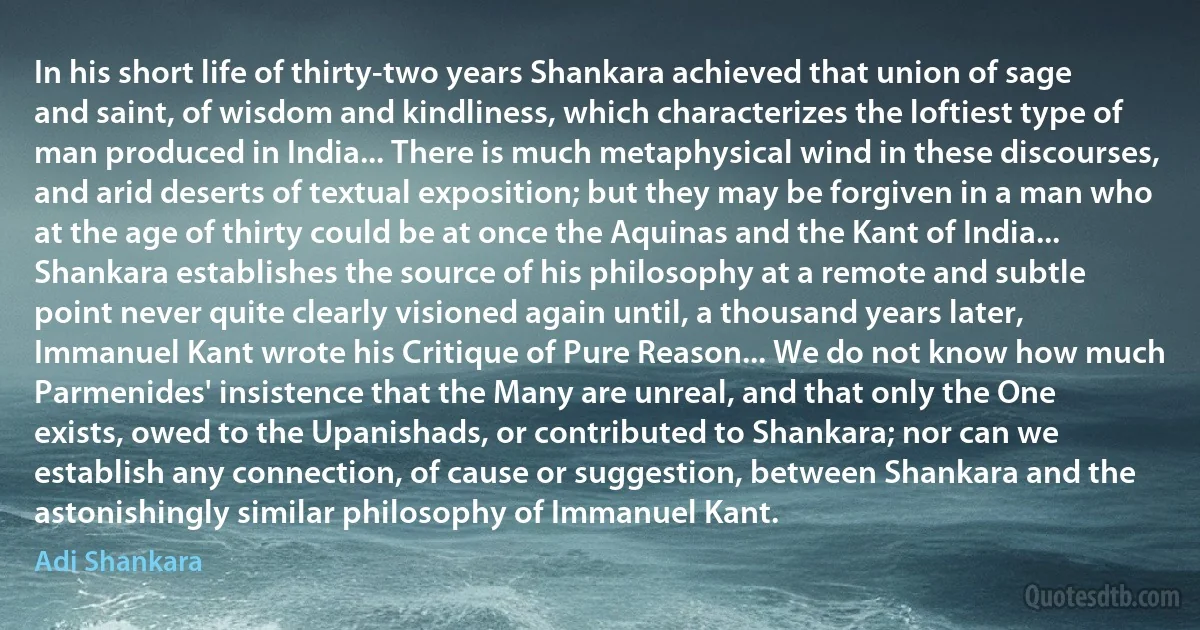
In his short life of thirty-two years Shankara achieved that union of sage and saint, of wisdom and kindliness, which characterizes the loftiest type of man produced in India... There is much metaphysical wind in these discourses, and arid deserts of textual exposition; but they may be forgiven in a man who at the age of thirty could be at once the Aquinas and the Kant of India... Shankara establishes the source of his philosophy at a remote and subtle point never quite clearly visioned again until, a thousand years later, Immanuel Kant wrote his Critique of Pure Reason... We do not know how much Parmenides' insistence that the Many are unreal, and that only the One exists, owed to the Upanishads, or contributed to Shankara; nor can we establish any connection, of cause or suggestion, between Shankara and the astonishingly similar philosophy of Immanuel Kant.
Adi ShankaraRelated topics
age cause connection critique exposition immanuel insistence kindliness later life man nor once point pure quite reason saint short source suggestion thirty thousand wind wisdom years Kant Aquinas ParmenidesRelated quotes
I am neither a saint nor a theologian. To me, good works are more important than theology. We all know that religion has been historically, and still is today, a cause of great evil as well as great good in human affairs. We have seen terrible wars and terrible persecutions conducted in the name of religion. We have also seen large numbers of people inspired by religion to lives of heroic virtue, bringing education and medical care to the poor, helping to abolish slavery and spread peace among nations. Religion amplifies the good and evil tendencies of individual souls. Religion will always remain a powerful force in the history of our species. To me, the meaning of progress in religion is simply this, that as we move from the past to the future the good works inspired by religion should more and more prevail over the evil.

Freeman Dyson
This book is about three Frenchmen who lived and wrote against the grain of these three ages of irresponsibility. They were very different men and would have been surprised to think of themselves as a group, yet they have something rather distinctive in common. All three played an important role in the France of their lifetime but lived at a slightly awkward tangent to their contemporaries. For much of his adult life each was an object of dislike, suspicion, contempt, or hatred for many of his peers and contemporaries; only at the end of their long lives were Léon Blum and Raymond Aron, for quite different reasons, able to relax into the comfort of near-universal admiration, respect, and, in some quarters, adulation. Camus, who had experienced all three by the age of thirty-five, died twelve years later an insecure and much-maligned figure; it would be thirty years before his reputation would recover.

Tony Judt
And as for the close connection between philosophy and poetry, we can refer to a little-known statement by Thomas Aquinas in his Commentary on Aristotle's Metaphysics [I, 3]: the Philosopher is akin to the Poet in this, that both are concerned with the mirandum, the "wondrous," the astonishing, or whatever calls for astonishment or wonder. This statement is not that easy to fathom, since Thomas, like Aristotle, was a very sober thinker, completely opposed to any Romantic confusion of properly distinct realms. But on the basis of their common orientation towards the "wonderful" (the mirandum - something not to be found in the world of work!) - on this basis, then, of this common transcending-power, the philosophical act is related to the "wonderful," is in fact more closely related to it than to the exact, special sciences; to this point we shall return.

Josef Pieper
Electric current, after passing into the earth travels to the diametrically opposite region of the same and rebounding from there, returns to its point of departure with virtually undiminished force. The outgoing and returning currents clash and form nodes and loops similar to those observable on a vibrating cord. To traverse the entire distance of about twenty-five thousand miles, equal to the circumference of the globe, the current requires a certain time interval, which I have approximately ascertained. In yielding this knowledge, nature has revealed one of its most precious secrets, of inestimable consequence to man. So astounding are the facts in this connection, that it would seem as though the Creator, himself, had electrically designed this planet just for the purpose of enabling us to achieve wonders which, before my discovery, could not have been conceived by the wildest imagination.

Nikola Tesla
We Europeans have to toil to achieve it, at least as a transitional stage, for it is what we feed our dreams upon. These Orientals [from India] have it in their blood, perhaps because they spend their lives I the sun. We poor wretched Europeans must sacrifice body and soul for even a shadow of it.. .It is not a question of trying to reproduce objective features, only of good practice for the fingers and for the perceptive faculty, and that too is very useful. You must have read how Van Gogh was always getting his brother to send him drawings to copy. And how Rembrandt used to copy Indian an Italian pictures. Not of course, because they were short of material, but to get 'du corps'. So one should be always drawing.. .Oh, you'd love the Indians. The pure, Aryan Indians, not those one could see in Berlin, whose forms had become rigid and sterile through mingling with the Chinese.

Ernst Ludwig Kirchner
